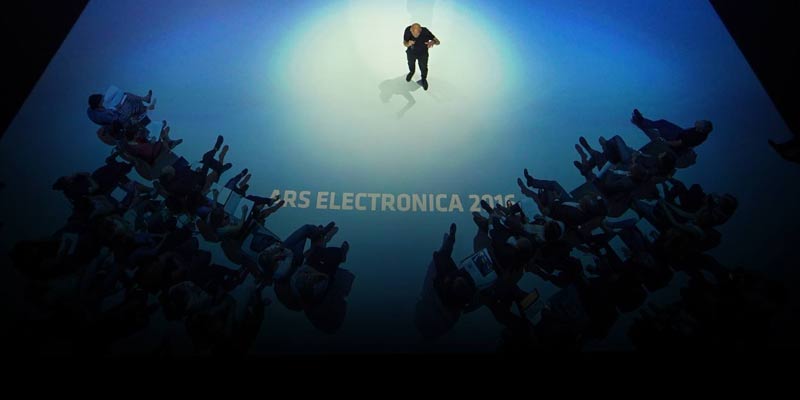Fronius Exhibition in the Foyer of the New Ars Electronica Center
(Linz, July 16, 2019) For the Ars Electronica Center, the 50th anniversary of the moon’s landing is the occasion to examine the reinvention of the future. More than 50 years ago, great efforts by scientists and technicians led to the moon landing. Today, a pioneering spirit is once again required to ensure the survival of mankind on Earth – the key words being energy generation and climate change. The Upper Austrian company Fronius is showing three visionary exhibits dealing with the use of renewable energy in the foyer of the Ars Electronica Center until August 18.
Renewable Energy
The use of renewable energies is an important factor in a sustainable way of life, as it is important to conserve resources and reduce greenhouse gas emissions in order to ensure conditions on earth that make life possible in the long term. The change from fossil materials to renewable energy is the only viable way, and not only in terms of climate and environmental protection. In view of dwindling fossil fuel resources and the ever more expensive and cost-intensive extraction of these resources, the switch to renewable energy sources is probably the only alternative.
In the foyer of the Ars Electronica Center, Fronius is showing three exhibits on the subject:
House of the Future
The installation illustrates the power supply cycle of an average “household of the future” by means of photovoltaics. Electricity, or more precisely, direct current, is generated via photovoltaic modules on the roof, from where it is fed into a so-called inverter and converted into alternating current for the household. However, there is a catch: if the electricity generated in this way during the day is fed into the public electricity grid, the household receives significantly less money for it than it hast o pay the evening when electricity is needed for the dishwasher, washing machine, computer and television. The solution is a battery module that stores the electricity generated during the day and makes it available in the evening.
SOLH2UB
In October 2018, Austria’s first green internal hydrogen refuelling facility was opened in Thalheim near Wels. Here, hydrogen is produced from solar electricity and water by electrolysis. This hydrogen is stored and is available for refuelling H2 vehicles. The hydrogen can be stored seasonally and, if required, converted back into electricity and heat by means of a fuel cell. This will also enable an innovative coupling of the electricity, mobility and heat sectors.
Model of a future world – 24 hours of the sun
The model shows a possible future world. A world that is 100% powered by renewable energy. Fronius calls this vision “24 hours of the sun”. In addition to private households, enterprises and various industrial companies are also represented, all of which are supplied by a mix of renewable energies, including solar, wind and hydropower.
Fronius
What began in 1945 as a one-man business today sets technological standards in the fields of welding technology, photovoltaics and battery charging. Fronius is currently active worldwide with around 4,760 employees, and 1,253 granted patents for product developments illustrate the innovative spirit of the company. For Fronius, sustainable development means implementing environmental and social aspects on an equal footing with economic factors.
http://www.flickr.com/photos/arselectronica/48296897441/
Home of the Future / Fotocredit: Ars Electronica – Robert Bauernhansl / Printversion
http://www.flickr.com/photos/arselectronica/48297009002/
Model of a future world – 24 hours sun / Fotocredit: Ars Electronica – Robert Bauernhansl / Printversion
http://www.flickr.com/photos/arselectronica/48296897641/
SOLH2UB / Fotocredit: Ars Electronica – Robert Bauernhansl / Printversion

